Home Tags Posts tagged with "dilma rousseff"
dilma rousseff
Over one million Brazilian protesters have joined demonstrations against President Dilma Rousseff, with many asking for her impeachment.
The protesters say Dilma Rousseff must have known about a corruption scandal in the state oil company, Petrobras.
The political opposition says much of the alleged bribery took place when Dilma Rousseff was head of the company.
However, Dilma Rousseff has been exonerated in an investigation by the attorney general and denies involvement.
Most of the politicians accused of taking bribes in a kickback scheme come from the governing coalition.
Protests have taken place across 22 Brazilian states and the federal capital, Brasilia.
The largest demonstration went ahead in Sao Paulo, attracting more than 500,000 people.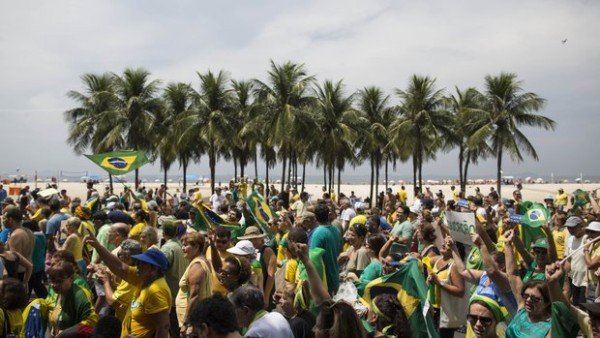
Many of the protesters waved Brazilian flags and wore the yellow shirts of the national football team.
They shouted slogans against corruption and the Workers’ Party government.
Opposition parties have backed Sunday’s protests but have not openly called for impeachment of President Dilma Rousseff.
Senator Aecio Neves, who was defeated by a narrow margin in October’s presidential vote, issued a statement praising the protests.
He said Brazilians “went to the streets to reunite with their virtues, their values and also with their dreams”.
In Rio de Janeiro, police said around 15,000 people had joined a protest there, while in Brasilia a crowd of 40,000 was reported.
On March 13, tens of thousands of President Dilma Rousseff took to the streets.
Her supporters say calls for an impeachment, less than five months after she was elected to a second four-year term, amount to a coup attempt.
The Workers’ Party has been in power since President Luiz Inacio Lula da Silva was sworn in for his first term in January 2003.
Earlier this month, the Supreme Court approved the investigation of 54 people for their alleged involvement in the kickback scheme.
The list was prepared by Attorney General Rodrigo Junot who alleged that private companies paid corrupt officials in order to get lucrative Petrobras contracts.
According to the investigation, high-profile politicians also took a share of the money siphoned off from Petrobras.
Rodrigo Junot’s list includes Senate President Renan Calheiros, President of the Chamber of Deputies Eduardo Cunha, former Energy Minister Edison Lobao and former President Fernando Collor de Mello. All deny corruption allegations.
[youtube rgi8XP8Vebw 650]
Brazil’s incumbent President Dilma Rousseff has been re-elected for a second term after securing more than 51% of votes in the closest election race in many years.
An official count showed Dilma Rousseff’s rival, centrist candidate Aecio Neves, taking just over 48% of the vote.
In her victory speech, Dilma Rousseff said she wanted to be “a much better president than I have been until now”.
She faced protests last year against corruption, record spending on the football World Cup and poor services.
Dilma Rousseff, who has been in power since 2010, is popular with poor Brazilians thanks to her government’s welfare programs.
The vote split Latin America’s biggest country almost evenly in two, along lines of social class and geography.
Dilma Rousseff called on all Brazilians “to unite in favor of Brazil’s future” and said she would seek political reform.
“This president is open to dialogue. This is the top priority of my second mandate,” she told a cheering crowd in the capital, Brasilia.

Brazil’s President Dilma Rousseff has been re-elected for a second term after securing more than 51 percent of votes in the closest election race in many years
She also thanked her supporters, especially her political mentor and predecessor Luiz Inacio Lula da Silva.
“I thank from the bottom of my heart our number one militant, President Lula.”
Dilma Rousseff’s re-election for a second term extends the rule of her Workers Party (PT), which came to power in 2002 with President Luiz Inacio Lula da Silva.
Aecio Neves, of the Brazilian Social Democracy Party (PSDB), admitted defeat in a speech to supporters in the southern city of Belo Horizonte.
He thanked the “more than 50 million Brazilians” who voted for him and said he had telephoned the re-elected president.
“I… wished her success in the administration of her next government, and I reaffirmed what I feel should be our greatest priority, to unite Brazil on the basis of an honorable project which dignifies all Brazilians,” he said at the rally.
Aecio Neves was the governor of the southern swing-state of Minas Gerais for eight years.
Both he and Dilma Rousseff had made economic growth and lifting Brazilians out of poverty central to their election campaigns.
[youtube 0RJ9jddQfOw 650]
Brazilians are voting in the second round of the presidential election in what correspondents say is the tightest vote the country has seen in decades.
Incumbent left-leaning President Dilma Rousseff of the Workers Party (PT) faces centrist Aecio Neves of the Brazilian Social Democracy Party (PSDB) in the second run-off round.
Both candidates have pledged to kick-start Latin America’s largest economy and make it more competitive.
The latest opinion polls showed President Dilma Rousseff with a slight lead over the opposition candidate.
A survey by pollster Datafolha gave Dilma Rousseff 52% voter support against 48% for Aecio Neves.
A separate survey by polling firm Ibope gave the incumbent 53% against 47% for her challenger.
Both polls had a margin of error of plus or minus 2%.
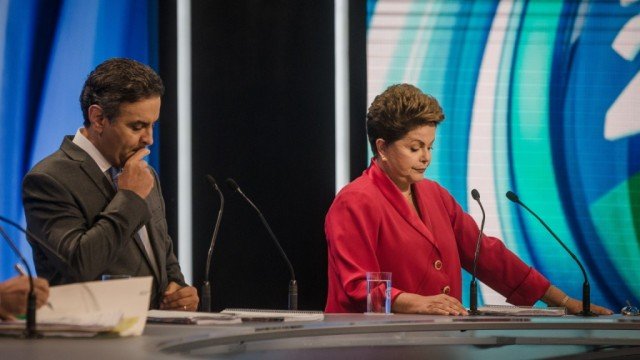
Leftist President Dilma Rousseff faces centrist Aecio Neves in the second run-off round of Brazil’s presidential election
Poor Brazilians, particularly in the impoverished northeast, remain loyal to Dilma Rousseff thanks to her party’s trademark welfare programs, such as the Bolsa Familia grant scheme.
Dilma Rousseff obtained her largest support there in the first round of the presidential election on 5 October, with almost 60% of votes.
But wealthy Brazilians, who are against interventionist economic policies such as petrol price controls and high taxes, favor instead business-friendly Aecio Neves.
Aecio Neves is regarded in the financial markets as someone to put the economy back on track, after four years of low growth rates with the country now technically in recession.
More than 140 million Brazilians will vote on October 26, but correspondents say much will depend on who wins the middle-class vote in the industrialized southeast.
On October 25, Aecio Neves campaigned in his native state, where he served two terms as governor, and paid a visit to the grave of his grandfather Tancredo, who was elected president in 1985 but died before taking office.
Dilma Rousseff, who has been serving as Brazil’s first woman president since 2010, spent instead the last day of campaigning in her southern stronghold of Porto Alegre, the capital of Rio Grande do Sul, where she held a rally.
The vote is widely seen as a referendum on 12 years of government by her Workers Party.
The PT came to power in 2002 with Luiz Inacio Lula da Silva as president.
Its policies are credited with lifting an estimated 40 million Brazilians out of extreme poverty.
However, President Dilma Rousseff’s government has faced allegations of corruption and of overspending in preparations for this year’s football World Cup.
She also presided over rising inflation and a recession this year.
The election comes after weeks of intensive campaigning by the two candidates and a presidential race that turned dramatic after Eduardo Campos, a main opposition candidate, was killed in a plane crash in August.
His running mate, a renowned environmentalist, Marina Silva, was thrust into his spot, vowing to become the South American country’s first “poor, black” president.
Marina Silva came third in the first round after Dilma Rousseff and Aecio Neves secured 41.5% and 33.5% of the vote respectively.
[youtube D-vtpOqUxBk 650]
Marina Silva has been formally named as the Brazilian Socialist Party’s new presidential candidate.
Environmental campaigner Marina Silva, 56, replaces the late Eduardo Campos, who was killed in a plane crash last week.
Marina Silva was Eduardo Campos’s running mate and served as environment minister.
She is seen as a leading challenger to President Dilma Rousseff, who’s seeking re-election in the October 5 poll.
PSB President Roberto Amaral told a news conference Marina Silva had been chosen unanimously.
Congressman Beto Albuquerque was named the party’s new vice presidential candidate.
Marina Silva will test President Dilma Rousseff’s status as favorite to win October’s election and make this a much more interesting process than it looked like being barely a week ago.
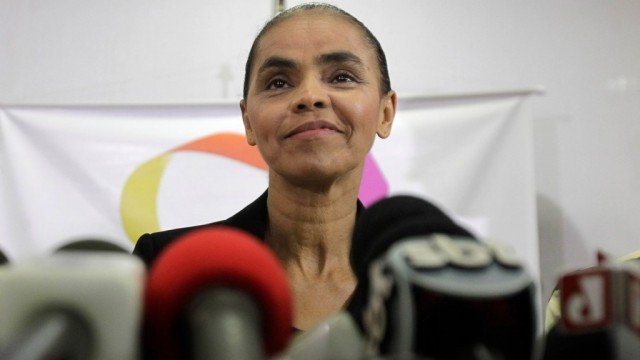
Marina Silva has been formally named as the Brazilian Socialist Party’s new presidential candidate (photo AP)
In the last presidential election, standing as the Green candidate, Marina Silva polled a credible 20% of the vote and is already a recognizable and much-admired figure across this continent-sized nation.
The first test of public opinion after Eduardo Campos’s death suggested Marina Silva could surpass the main opposition PSDB candidate Aecio Neves in the first round and beat current President Dilma Rousseff in the second, although both outcomes were within the poll’s margin of error.
However, analysts caution that, with the strong emotional reaction to last week’s events, a bounce in the polls was inevitable and the picture could change substantially.
A devout evangelical Christian who overcame poverty, Marina Silva only learnt to read and write when she was 16.
Correspondents say she appeals mostly to young voters who are unhappy with the Brazilian political establishment.
On Sunday, more than 100,000 people in Brazil paid their last respects to the late presidential candidate, Eduardo Campos, a former governor and rising political star.
They attended a funeral Mass and filled the streets of the city of Recife to follow the passage of his coffin.
Eduardo Campos’s jet crashed on August 13 in bad weather in the port city Santos, near Sao Paulo, killing six other people. Investigators are still trying to establish the exact causes of the accident.
[youtube t27iw9gbeOw 650]
According to the Brazilian Air Force (FAB), the black box recovered from the wreckage of the plane crash that killed Brazilian presidential candidate Eduardo Campos did not record his flight.
It said the audio recording FAB experts had analyzed was not related to the flight that crashed on Wednesday.
A spokesman said they were trying to determine what the recording was.
Eduardo Campos, 49, and six others died when his private jet crashed in bad weather in the port city of Santos near Sao Paulo.
Experts from the Centre of Investigation and Prevention of Aeronautical Accidents in the Brazilian capital, Brasilia, have been trying to reconstruct the audio files from the black box in search for more clues as to what happened in the lead up to the accident.
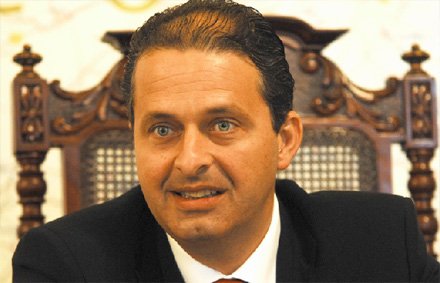
The Brazilian Air Force says the black box recovered from the wreckage of the plane crash that killed Eduardo Campos did not record his flight
“The two hours of audio, the maximum recording capacity of the equipment, which were received and validated by certified technicians, were not of the flight of August 13,” air force spokesman Pedro Luis Farcic said in a statement.
“It is not yet possible to determine the date of the dialogue recorded in the CVR (Cockpit Voice Recorder), given that this equipment does not record this information,” he continued, adding that an investigation would determine what may have happened.
Shortly after the accident, Brazil’s President Dilma Rousseff declared three days of mourning and halted all her re-election campaign activities for October’s presidential poll.
Eduardo Campos, of the Brazilian Socialist Party (PSB), had been running third in opinion polls.
It is not yet clear who will replace him as presidential candidate for the PSB.
The PSB has said it will meet on August 20.
Analysts say his running mate, 56-year-old Marina Silva, a popular politician and a former environment minister, could step in.
Under Brazilian law, the party has 10 days to choose a substitute.
It could also decide not to run and throw its support behind another candidate.
Eduardo Campos, a former governor of the north-eastern state of Pernambuco, was on his way from Rio de Janeiro to the city of Guaruja, near Santos, when the Cessna 560XL he was travelling in went down into a residential area, killing everyone on board.
Officials have blamed the crash on bad weather, but a federal investigation on the cause remains underway.
Brazil’s presidential candidate Eduardo Campos has died in a plane crash, party members and local officials say.
The Brazilian Air Force reported the plane was a Cessna 560XL.
The plane carrying Eduardo Campos came down in bad weather in a residential area of the port city of Santos, in Sao Paulo state.
Local reports say four other passengers and the two pilots were also killed.
President Dilma Rousseff has declared three days of national mourning and cancelled campaign events.
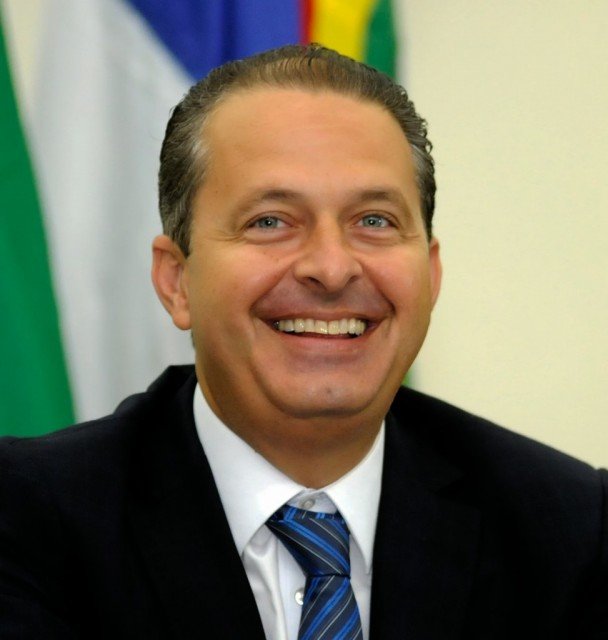
The plane carrying Eduardo Campos came down in bad weather in a residential area of the port city of Santos
Dilma Rousseff’s Vice President, Michel Temer, also expressed his regret over the death of Eduardo Campos, who had been running third in the polls for October’s election.
Eduardo Campos’ family had actively opposed Brazil’s military rule between 1964 and1985.
A married father of five children, Eduardo Campos, 49, served two terms as governor of the north-eastern Pernambuco state.
His vice-presidential candidate, Marina Silva, a popular politician and a former government minister, was reportedly meant to have been on the plane with him but decided not to travel.
Eduardo Campos was flying from Rio de Janeiro to Guaruja airport, outside Sao Paulo, when it hit bad weather, aviation authority spokesman Pedro Luis Farcic said.
According to air force officials, air traffic control lost contact with the plane after it was unable to land at Guaruja due to bad weather.
It plunged into several houses in a densely-populated neighborhood, sending plumes of smoke into the air.
Local residents said the sky was cloudy and it was raining at the time of the crash.
All seven people aboard the plane, including a campaign photographer and cameraman, a press adviser, as well as two pilots, died in the crash, City Hall press officer Patricia Fagueiro told the Associated Press news agency.
[youtube P89-8nL_B9k 650]
President Dilma Rousseff has urged Brazilians to bounce back after the national soccer team devastating 7-1 World Cup defeat against Germany.
“Like all Brazilians, I am very, very sad after the defeat. But we will not let ourselves be broken,” Dilma Rousseff tweeted.
The coach of the Brazilian team Luiz Felipe Scolari called the defeat “the worst day of his life”.
Brazilian media reflected the mood of shock on Wednesday, describing the result as a “historic humiliation”.
The result was Brazil’s biggest defeat in World Cup finals history.
“I feel bad for all of us – for fans and for our players,” Dilma Rousseff said, urging Brazilians to “get up, shake off the dust and come out on top”.
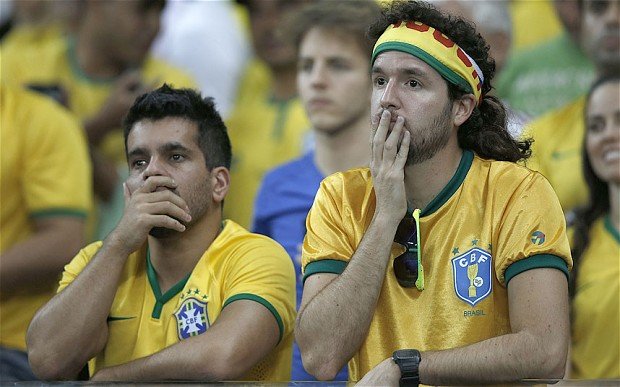
President Dilma Rousseff has urged Brazilians to bounce back after the national soccer team devastating 7-1 World Cup defeat against Germany
Some have speculated that the team’s poor showing may affect Dilma Rousseff’s chances in the presidential election in October.
“Brazil’s historic humiliation has set off a warning signal in Dilma Rousseff’s government, which fears that the bad mood stemming from the defeat may affect expectations for the economy – already not very favorable – as well as the campaign trail,” a column in the Folha de Sao Paulo newspaper said.
It added that fans in the stadium had chanted insults about Dilma Rousseff.
The German team established a 5-0 lead within just 29 minutes, adding two more goals in the second half.
By the end of the match many of the remaining Brazilian fans were cheering the German team.
The match was the first time a team had scored seven goals in a World Cup semi-final, and the first World Cup game with eight or more goals since Germany beat Saudi Arabia 8-0 in 2002.
Brazil’s President Dilma Rousseff has been officially endorsed by the governing Workers Party to run for re-election in October.
Speaking to party delegates in Brasilia, Dilma Rousseff promised to boost social policies that have lifted millions of people out of poverty.
The party has been in power since 2003.
Dilma Rousseff – Brazil’s first woman president – is a former left-wing rebel who fought against military rule in the 1960s and 1970s.
She told some 800 delegates meeting at the party’s convention that her second term would see more investment in housing, education and public health.
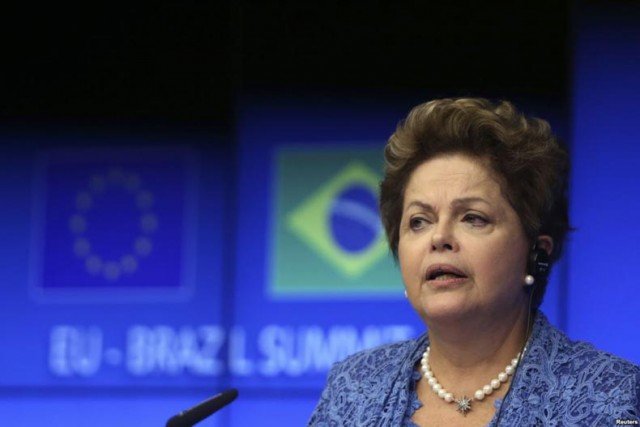
President Dilma Rousseff has been officially endorsed by the governing Workers Party to run for re-election in October (photo Reuters)
Dilma Rousseff also defended public spending on preparations for the football World Cup and the Olympics, which Rio de Janeiro will host in 2016.
“All the investment we have done for the World Cup in transport and other infra-structure will continue to benefit Brazilians after the event,” she said.
She was elected in 2010, replacing her friend and mentor, former President Luiz Inacio Lula da Silva, who served two terms.
Brazilians will go to the polls on October 5. If no single candidate gets more than 50% of the vote, there will be a runoff on October 26.
Opinion polls suggest that Dilma Rousseff has about 40% poll ratings, against 20% for her main opponent, Senator Aecio Neves.
But her popularity has declined over the years, with Brazilians taking to the streets to protest against corruption and spending on the World Cup and Olympics.
Party leaders have denounced “a hate campaign” against the government.
The Workers Party is expected to face its biggest electoral challenge since former President Luiz Inacio Lula da Silva came to power in 2002.
[youtube Je33KJL0Upk 650]
President Dilma Rousseff says Brazil is ready for the football World Cup which starts on Thursday.
In a TV address, Dilma Rousseff said “the pessimists” had been defeated by the determination of the Brazilian people.
She rejected criticism of overspending, saying that the tournament would leave a lasting legacy of infrastructure.
Brazil has seen a year of protests against bad governance and perceived excessive spending on the World Cup.
Metro strikes are also threatening to disrupt the opening game in Sao Paulo.

President Dilma Rousseff says Brazil is ready for the football World Cup 2014
Speaking less than 48 hours before the start of the tournament, President Dilma Rousseff said that visitors would not be taking away infrastructure projects “in their suitcases”, which would instead remain in the country as a benefit for everyone.
Dilma Rousseff defended the $11 billion expenditure on the tournament, calling it a “false dilemma” that World Cup spending somehow diminished investments in health and education.
The budget for these areas between 2010 and 2013 was many times greater than the investment in stadiums, she added.
“Rest assured of this, the World Cup accounts are being meticulously scrutinised by the country’s auditing institutions,” she said.
It follows criticism by local residents who say that many promised development projects have been delayed or never materialized.
The World Cup will kick off on Thursday with a match between the hosts Brazil and Croatia at the Itaquerao stadium, or Arena Corinthians, in the outskirts of Sao Paulo.
However, work is still continuing to prepare the stadium ahead of the opening match.
Meanwhile, union leaders are threatening to resume a metro strike in Sao Paulo during the tournament if their demands are not met.
They are calling for staff threatened with dismissal for their involvement in strike-related disturbances to be reinstated,
A five-day stoppage that began last week caused wide scale traffic chaos, with fears that a repeat of the disruption could prevent fans and employees from attending group stage matches. The strike was suspended on Monday.
Dilma Rousseff has said she would not allow demonstrations to disrupt the tournament.
Thousands of extra police and soldiers will be deployed to ensure the matches get under way smoothly.
[youtube eJ_MeZ1g41Q 650]
Sao Paulo police say they have detained 128 people during clashes that followed a demonstration against this year’s football World Cup in Brazil.
A car was set on fire. Shops, banks and a police vehicle were also damaged.
The violence forced the authorities to cancel some of the festivities planned for the city’s 460th anniversary.
Earlier, some 2,500 people took to the street to complain about the costs of staging the World Cup.
They marched through central Sao Paulo waving flags, carrying banners and chanting: “There will be no Cup.”
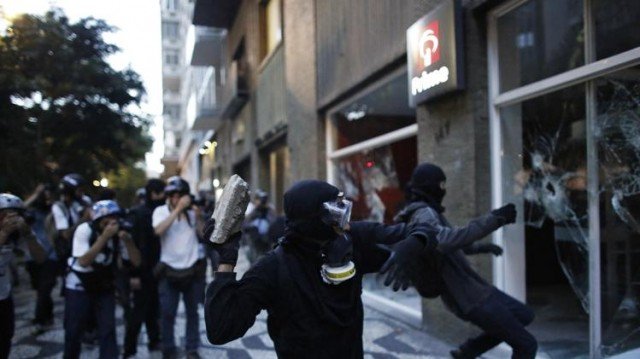
Sao Paulo peaceful protest was marred by sporadic acts of vandalism which turned into clashes with the police
Other Brazilians protested on Twitter, saying “FIFA go home”, in reference to football’s world governing body. There were similar small protests in Rio de Janeiro and other cities.
Saturday’s peaceful protest was marred by sporadic acts of vandalism which turned into clashes with the police.
Some demonstrators attacked an empty police car and tried to overturn it, while others torched a small car. They also burned tires and targeted banks and others businesses.
The Sao Paulo state Governor Geraldo Alckmin condemned the violence.
Fifteen people were also reported to have been detained at a protest near the World Cup stadium in Natal, a city in north-eastern Brazil.
Last year, more than a million people took to the street in dozens of Brazilian cities over poor public services, corruption and the high cost of the World Cup.
The wave of protests prompted Brazil’s President Dilma Rousseff to propose a referendum on political reform.
Dilma Rousseff also pledged to invest 50 billion reais ($25 billion) in public transport, one of the protesters’ main grievances.
[youtube GUEBfU2zukI 650]
Edward Snowden offered to collaborate with Brazil’s investigation into the mass surveillance programs Tuesday, writing an open letter that hinted at his asylum request to the country.
In a letter published in the Folha De S. Paulo newspaper, Edward Snowden praised the “inspiring” reaction around the world – and in Brazil – after he unveiled the NSA’s far-reaching spying program, which included the monitoring of Brazilian President Dilma Rousseff’s personal cellphone.
“I have expressed my willingness to assist wherever appropriate and lawful, but unfortunately the United States government has worked very hard to limit my ability to do so,” Edward Snowden wrote in An Open Letter to the Brazilian People.
“Until a country grants permanent political asylum, the U.S. government will continue to interfere with my ability to speak,” he added.
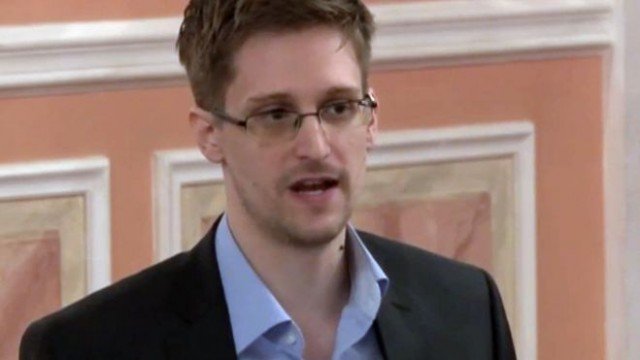
Edward Snowden offered to collaborate with Brazil’s investigation into the mass surveillance programs
Brazilian lawmakers have been trying to interview Snowden as part of their investigation but he seemed to suggest in his letter that he would only do so if he were welcomed into the country.
Edward Snowden previously requested asylum in Brazil but he has not received any response. He is currently living under temporary asylum in Russia, after spending weeks in limbo at Moscow’s international airport.
Documents Edward Snowden leaked exposed Brazil as the top NSA target in Latin America, with surveillance that included hacking into the network of state-run oil company Petrobras and monitoring Dilma Rousseff’s and ordinary Brazilians’ phones.
The revelations soured relations between Brazil and the US with President Dilma Rousseff canceling a state visit to Washington.
“Only three weeks ago, Brazil led the United Nations Human Rights Committee to recognize for the first time in history that privacy does not stop where the digital network starts, and that the mass surveillance of innocents is a violation of human rights,” Edward Snowden wrote, adding that “American officials should never decide the freedoms of Brazilian citizens.”
Edward Snowden’s open letter was also published on the Facebook page of David Miranda, partner of journalist Glenn Greenwald, who first published Snowden’s leaks in June. David Miranda has started a petition calling for Brazil to offer Edward Snowden asylum.
[youtube 3h-e7q4OXZI 650]
Nelson Mandela memorial service is one of the largest gatherings of its kind in generations.
Tens of thousands of mourners and almost 100 foreign leaders attended the event at the FNB stadium in Johannesburg.
World leaders attending Nelson Mandela’s memorial service:
– US President Barack Obama and first lady Michelle Obama as well as former Presidents George W. Bush, Bill Clinton and Jimmy Carter
– UN Secretary General Ban Ki-moon and his predecessor Kofi Annan.
– UK Prime Minister David Cameron, Deputy Prime Minister Nick Clegg and Labour Party leader Ed Miliband
– French President Francois Hollande and his predecessor Nicolas Sarkozy
– German President Joachim Gauck
– Zimbabwe’s President Robert Mugabe
– Cuban President Raul Castro
– Brazilian President Dilma Rousseff
– Indian President Pranab Mukherjee
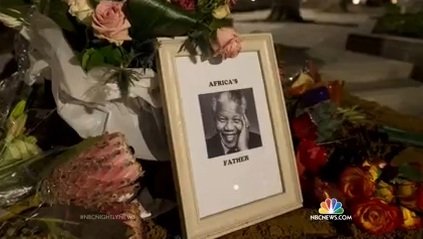
Nelson Mandela memorial service is one of the largest gatherings of its kind in generations
– Namibian President Hifikepunye Pohamba
– Chinese Vice-President Li Yuanchao
– President of the Palestinian Authority Mahmoud Abbas
– Kenyan President Uhuru Kenyatta
– Canadian Prime Minister Stephen Harper
– Spanish Prime Minister Mariano Rajoy and Prince Felipe
– Australian Prime Minister Tony Abbott
– Romanian Prime Minister Victor Ponta
– Afghan President Hamid Karzai
– Pakistan’s President Mamnoon Hussain
– Sri Lanka’s President Mahinda Rajapaksa
– The Netherlands’ King Willem-Alexander and Foreign Minister Frans Timmermans
– Norway’s Crown Prince Haakon and Prime Minister Erna Solberg
– European Commission President Jose Manuel Barroso and European Union Council President Herman Van Rompuy
– Top Vatican official Cardinal Peter Turkson of Ghana
– British entrepreneur Richard Branson
– US talk show host Oprah Winfrey
– U2 singer and activist Bono
– Musician Peter Gabriel, who brought the idea of The Elders – a group of former leaders – to Nelson Mandela
– British Model Naomi Campbell
[youtube xrMJ0QSfugo 650]
Brazil and Germany have asked the UN General Assembly to adopt a draft resolution calling for the right to privacy in the digital age.
The draft calls for an end to excessive electronic surveillance, noting that the illegal collection of personal data “constitutes a highly intrusive act”.
Brazil and Germany have both been angered by allegations of large-scale US surveillance.
The allegations stem from revelations by NSA whistleblower Edward Snowden.
The draft resolution, which does not name individual countries, will be debated by a General Assembly committee focusing on human rights.
The draft calls on the 193-member assembly to declare that it is “deeply concerned at human rights violations and abuses that may result from the conduct of any surveillance of communications”.
This includes “extraterritorial surveillance of communications, their interception, as well as the collection of personal data, in particular massive surveillance, interception and data collection”.
The resolution, which will be voted on later this month, calls on all countries to protect the right to privacy guaranteed under international law.

The UN draft resolution follows allegations that the US has been eavesdropping on foreign leaders, including Brazilian President Dilma Rousseff and German Chancellor Angela Merkel
While General Assembly resolutions are non-binding, they can carry significant moral and political weight if they win enough support.
The draft follows allegations that the US has been eavesdropping on foreign leaders, including Brazilian President Dilma Rousseff and German Chancellor Angela Merkel, angering US allies in Europe and Asia.
Disclosures about the extent of US spying activity came from documents leaked to media organizations by Edward Snowden.
Angela Merkel’s anxiety about US spying overshadowed last week’s EU summit, when she remarked with irritation that spying on friends is “really not on”.
Dilma Rousseff was angered by revelations that the NSA had hacked the computer network of Brazil’s state-run oil company Petrobras to collect data on emails and telephone calls.
[youtube f3hPQGCO-eE 650]
Brazil’s President Dilma Rousseff has criticized the US over allegations it carried out electronic espionage.
Speaking at the opening of this year’s UN General Assembly, Dilma Rousseff said Brazil would adopt legislation and technology to protect itself from illegal intercepts.
She called Washington’s argument that spying on Brazil was to protect nations from terrorists “untenable”.
Earlier this month, the Brazilian president cancelled a planned visit to Washington.
Dilma Rousseff told the assembled leaders that Brazil had been a target of intrusions and intercepts carried out by a “global network of electronic espionage”.
She said that “corporate information – often of high economic and even strategic value – was at the centre of espionage activities”.
Dilma Rousseff said such tampering with another country’s affairs was an “affront to the principles that must guide the relations among friendly nations”.
Her speech came a week after she called off a high-profile visit to the United States after a string of allegations about the extent of the US spying programme emerged.
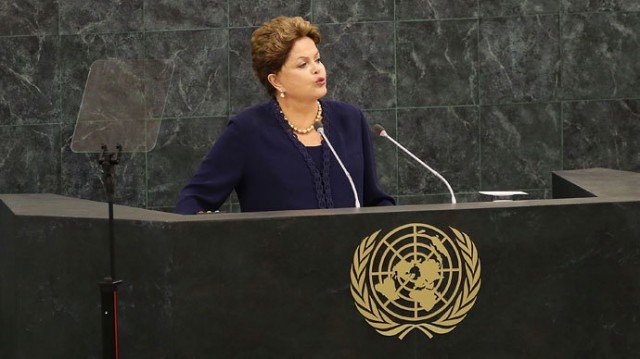
Brazil’s President Dilma Rousseff has criticized the US over allegations it carried out electronic espionage
Dilma Rousseff rejected arguments put forward by the US that the illegal interception of information was aimed at protecting nations against terrorism.
“Brazil, Mr. President, knows how to protect itself,” she said.
“We face, Mr. President, a situation of a grave violation of human rights and civil liberties; of invasion and capture of confidential information concerning corporate activities, and especially of disrespect to national sovereignty,” Dioma Rousseff added.
The allegations of widespread espionage against Brazilian citizens were first published in July by Rio de Janeiro-based journalist Glenn Greenwald, a reporter for the British Guardian newspaper.
Glenn Greenwald alleged that the NSA accessed all internet content that Dilma Rousseff had visited online.
Earlier this month, another report by Glenn Greenwald alleged that the NSA had also illegally accessed data from Brazil’s state oil company, Petrobras.
Petrobras is due next month to carry out an important auction for exploration rights of an oil field off the Rio de Janeiro state coast.
Dilma Rousseff said that her government would “do everything within its reach to defend the human rights of all Brazilians and to protect the fruits borne from the ingenuity of our workers and our companies”.
Brazil’s leader asked the UN to play a leading role in regulating electronic technology and said Brazil would present proposals for a “civilian multilateral framework” for the governance and use of the internet and to protect web-based data.
[youtube 3_hzgIyz4X0]
Brazil’s President Dilma Rousseff has called off a state visit to the US next month in a row over allegations of American espionage.
The US National Security Agency (NSA) has been accused of intercepting emails and messages from Dilma Rousseff, her aides and state oil company, Petrobras.
The allegations were based on documents leaked by fugitive former intelligence contractor Edward Snowden.
President Barack Obama had promised to investigate the incident.
The White House said he had telephoned Dilma Rousseff on Monday to discuss the matter.
The allegations of widespread espionage against Brazilian citizens were first published in July by Rio de Janeiro-based journalist Glenn Greenwald, a reporter for the Guardian newspaper.
Glenn Greenwald alleged that the NSA accessed all internet content that Dilma Rousseff had visited online.
The documents, according to the report, were part of an NSA case study showing how data could be intelligently filtered.
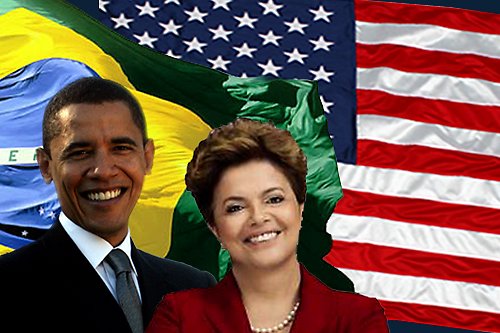
Brazil’s President Dilma Rousseff has called off a state visit to the US next month in a row over allegations of American espionage
Earlier this month, another report by Glenn Greenwald on Globo Television alleged that the NSA had illegally accessed data from oil company Petrobras.
The company is due next month to carry out an important auction for exploration rights of an oil field off the Rio de Janeiro state coast.
Dilma Rousseff has said that if the accusations are proven it means the NSA was involved in “industrial espionage”.
Her US state visit, starting on October 23, was to be the first by a Brazilian president since 1995.
In a statement on Tuesday, the Brazilian government said that “given the proximity of the scheduled state visit to Washington – and in the absence of a timely investigation of the incident, with corresponding explanations and the commitment to cease the interception activities” it could not go ahead as planned.
The statement said Brazil hoped the visit would take place “as soon as possible”, once the issue had been “resolved properly”.
White House spokesman Jay Carney said that the postponement had been a joint decision between Dilma Rousseff and Barack Obama, who agreed it “should not be overshadowed by any bilateral issue”.
The White House said in a statement: “The president has said that he understands and regrets the concerns [that] disclosures of alleged US intelligence activities have generated in Brazil and made clear that he is committed to working together with President Rousseff and her government in diplomatic channels to move beyond this issue as a source of tension in our bilateral relationship.”
The NSA has been accused of looking into electronic communications from what the US sees as hostile Latin American governments, such as Venezuela and Ecuador, as well as traditional allies, including Mexico.
At the G20 meeting in Russia earlier this month, Barack Obama promised to investigate the allegations of espionage against Dilma Rousseff and her Mexican counterpart, Henrique Pena Nieto.
[youtube X2_167XbOzM]
Brazil announces it will demand an explanation from the US after allegations that the National Security Agency (NSA) spied on Brazilian government communications.
The allegations were made by Rio-based journalist Glenn Greenwald in a programme on TV Globo on Sunday.
Glenn Greenwald obtained secret files from whistle-blower Edward Snowden.
Communications from the Mexican president were also accessed by the NSA, Glenn Greenwald said.
Glenn Greenwald, a columnist for the Guardian newspaper, told TV Globo’s news programme Fantastico that secret documents leaked by Edward Snowden showed how US agents had spied on communications between aides of Brazil’s President Dilma Rousseff.
Brazil’s Justice Minister Jose Eduardo Cardozo said that “if these facts prove to be true, it would be unacceptable and could be called an attack on our country’s sovereignty”.
According to the report, the NSA also used a program to access all internet content that President Dilma Rousseff visited online.
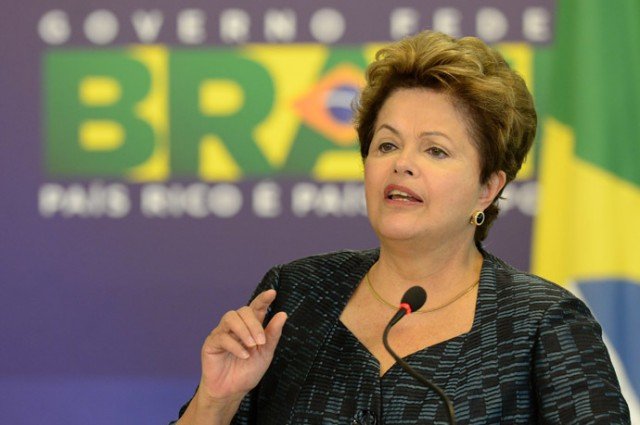
Edward Snowden’s documents showed how US agents had spied on communications between aides of Brazil’s President Dilma Rousseff
The report also alleges that the NSA monitored the communications of Mexican President Enrique Pena Nieto before he was elected.
Glenn Greenwald said that a document dating from June 2012 showed that Enrique Pena Nieto’s emails were being read.
A spokesman for the Mexican foreign ministry told the Agence France Presse news agency that he had seen the report but had no comment.
The documents were provided to Glenn Greenwald by ex-US intelligence analyst Edward Snowden, who was granted temporary asylum in Russia after leaking secret information to media in the US and Britain.
Glenn Greenwald was the first journalist to reveal the secret documents leaked by Edward Snowden on June 6. Since then, he has written a series of stories about surveillance by US and UK authorities.
The detention last month for nine hours at London’s Heathrow airport of Glenn Greenwald’s partner, David Miranda, caused widespread controversy in the UK and abroad.
Glenn Greenwald said the detention of his partner amounted to “bullying” and was “clearly intended to send a message of intimidation” to those working on the NSA revelations.
The British government said that it was right for the police to act if they believed that someone had “highly sensitive stolen information”.
[youtube 0OVs7RNOWE0]
Brazil’s Foreign Minister Antonio Patriota has quit in the wake of a diplomatic scandal with Bolivia.
Antonio Patriota resigned after a Bolivian opposition politician holed up in the Brazilian embassy in La Paz for more than a year fled the country in a diplomatic car.
A Brazilian official has admitted using his diplomatic immunity to drive the senator across the border without permission from either country.
Senator Roger Pinto was given asylum at the Brazilian embassy last year.
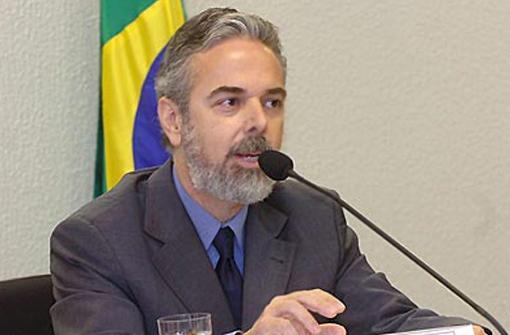
Antonio Patriota resigned after a Bolivian opposition politician holed up in the Brazilian embassy in La Paz for more than a year fled the country in a diplomatic car
He had been accused of at least 14 crimes in Bolivia, including corruption. He denied the charges and asked for asylum saying he was being persecuted.
Antonio Patriota’s resignation was announced in a brief statement from the office of President Dilma Rousseff on Monday.
The same statement named Luiz Alberto Figueiredo, Brazil’s head of mission at the UN, as the new foreign minister. Anonio Patriota is to become Brazil’s new UN ambassador, officials said.
Brazilian diplomat Eduardo Saboia said he used his diplomatic immunity to get Roger Pinto out of Bolivia, leaving with him in an official vehicle on Friday, she says.
Eduardo Saboia said Roger Pinto had been suffering from depression and he had taken a personal decision to help him.
The senator had been living in a small room in the Brazilian embassy for the past 450 days.
After the escape was revealed, Bolivia accused Brazil of violating international agreements and demanded an explanation.
According to Brazilian media, President Dilma Rousseff’s government did not know of the operation and considered it a “disaster”.
Roger Pinto, who arrived in Brasilia on Sunday, says the charges against him are politically motivated and have been fabricated by the Bolivian government.
Hundreds of thousands of Catholics have gathered at Copacabana Beach in Rio de Janeiro for the opening of the World Youth Day festival.
The highlight of the festival will be a visit on Thursday by Pope Francis.
Pope Francis arrived on Monday for his first trip abroad since becoming head of the Roman Catholic Church.
The pontiff’s visit is taking place under tight security, after weeks of protests against the government and corruption.
Tuesday’s evening mass at Copacabana Beach will be led by Rio’s Archbishop Orani Joao Tempesta.

Hundreds of thousands of Catholics have gathered at Copacabana Beach in Rio de Janeiro for the opening of the World Youth Day festival
Pope Francis will welcome pilgrims to the five-day festival, which is expected to draw about 1.5 million people from around the world.
The Pope, who is from neighboring Argentina, has no public events scheduled for Tuesday and was spending time at a private residence.
Correspondents say Brazil is reviewing security around the 76-year-old pontiff after he was mobbed by adoring crowds following his arrival in Brazil on Monday.
Many were able to stop the Pope’s motorcade as it travelled through Rio and reach their hands inside his car’s open window.
“The Pope’s secretary told me he was terrified, but the Pope kept smiling,” Vatican spokesman Federico Lombardi told reporters.
Pope Francis was officially welcomed at the state governor’s palace by President Dilma Rousseff. However, police outside later fired tear gas to disperse people who were protesting against the government, but also against the cost of the papal visit.
On Wednesday Pope Francis will visit the Shrine of Our Lady of Aparecida in Sao Paulo state, where a homemade explosive device was discovered on Sunday.
The authorities said the device was “of low power” and nowhere near the area where the Pope and pilgrims will visit.
[youtube V6ic0VqfJU8]
Pope Francis has been greeted by tens of thousands of Brazilian pilgrims as he toured Rio de Janeiro in an open car and then met President Dilma Rousseff at the state governor’s palace.
After the pontiff left, police fired tear gas to disperse protests against both the government and the cost of the visit.
Pope Francis is in Brazil to attend the Roman Catholic World Youth Day festival.
In a speech soon after his arrival, the Pope urged young Catholics to “make disciples of all nations”.
“I came to meet young people coming from all over the world, drawn to the open arms of Christ the Redeemer,” he said at the governor’s palace, referring to Rio’s famous vast statue of Jesus.
“They want to find a refuge in his embrace, right near his heart to hear his call clearly and powerfully.”
About an hour after the welcoming ceremony, police fired stun grenades and tear gas against the demonstrators outside the palace.
It was the latest rally against what the protesters described as endemic government corruption across the country.
But some were also unhappy about $53 million in public fund being spent for the pontiff’s visit.
There was little damage and few arrests, but it was a reminder that there is still a real possibility the pontiff’s high-profile visit to a huge Catholic festival in Rio could be overshadowed by political events.
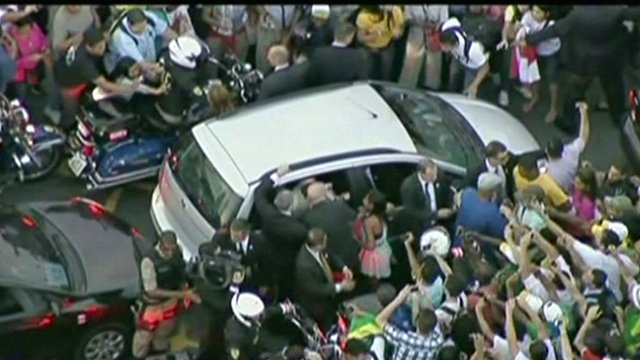
Crowds mobbed Pope Francis’ car in Rio de Janeiro as it made its way from the airport
In a separate development, the military said a homemade explosive device had been discovered at a shrine between Rio and Sao Paulo that the Pope is due to visit on Wednesday.
The device at the Shrine of Our Lady of the Conception of Aparecida was described as being “of low power” and was destroyed.
As Pope Francis disembarked from the Alitalia plane in Rio’s airport earlier on Monday, he was welcomed by President Dilma Rousseff to cheers and applause from the waiting crowd. A choir sang an anthem linked to Youth Day and he was presented with a bouquet of flowers.
The Pope waved before being taken by motorcade to the centre of Rio, where thousands of pilgrims have gathered.
Pope Francis looked relaxed and jovial as he was driven into Rio de Janeiro in a modest family car, with the window wound down and security officials struggling to keep back the crowds.
There were chaotic scenes as his car became stuck in one of the city’s infamous traffic jams, after the pope’s driver reportedly took the wrong turn and missed lanes that had been cleared by the security services.
Crowds immediately gathered round the vehicle hoping to catch a glimpse or touch Pope Francis. One woman passed her baby through the window for a kiss from the Holy Father.
Once in the city centre, the Pope switched to an open-air Popemobile, waving at the tens of thousands who lined the streets he travelled through.
The authorities have increased security during the Pope’s seven-day visit, following weeks of nationwide protests against corruption and bad governance.
Pope Francis refused to use an armored Popemobile, despite requests from Brazilian officials. Some 30,000 security staff – army and police are on duty throughout his visit.
More than a million young Catholics are expected to gather in Rio for World Youth Day, which takes place every two years, and is a celebration of the Catholic faith.
The Argentina-born Pope – who became head of the Catholic Church in March – is due to lead a prayer service on Copacabana beach on Thursday. He will also visit one of Rio’s shanty towns.
Speaking to reporters on his flight from Rome, the Pope said young people were “at this moment are in crisis,” in an apparent reference to the continuing economic crisis across Europe.
“We run the risk of having a generation that hasn’t worked,” he said, even though work confers dignity.
Pope Francis also criticized what he said was a “culture” of socially rejecting the elderly who were “thrown away” as if they had nothing to offer.
[youtube vGngxrajDmg]
Brazilian protesters have clashed with police during the Confederations Cup final between the host nation and Spain in Rio de Janeiro.
Riot police fired tear gas as demonstrators threw missiles near the Maracana football stadium.
President Dilma Rousseff did not attend the match. She was booed at the opening of the tournament.
The protests started nearly a month ago, sparked by transport fare rises, but quickly encompassed other issues.
The main grievances are over the costs of staging the World Cup, corruption and demands for better health, education and transport.
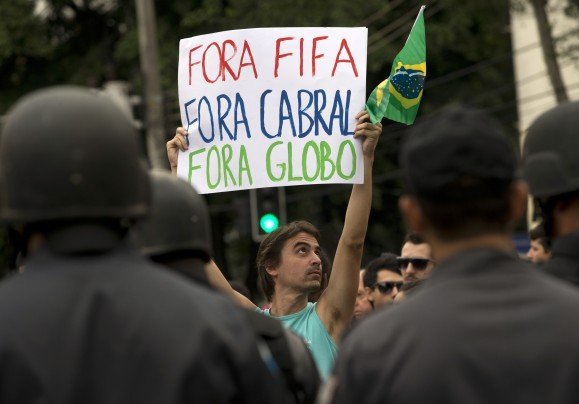
Brazilian protesters have clashed with police during the Confederations Cup final between the host nation and Spain in Rio de Janeiro
Earlier on Sunday a group of demonstrators tried to storm a Brazilian Football Association (CBF) building in Rio. But police kept them back and the group settled outside the building.
The protesters demanded the resignation of CBF president Jose Maria Marin, who has been accused of incompetence.
In a separate protest, several thousand people marched on Maracana stadium banging drums.
They demanded free public transport, carrying placards reading “FIFA – you pay the bill”. The demonstrators also called for and end to corruption and the resignation of the Rio State governor.
Minutes before the game began, small groups of protesters threw rocks and firecrackers at police lines.
Security forces responded with tear gas and sent armored vehicles to disperse the demonstrators. There were no further incidents during the game – which saw Brazil beat Spain 3-0.
The wave of protests began nearly a month ago in the city Sao Paulo after bus fares were increased by 10%.
But after heavy-handed police action, it spread to other cities and mobilized public opinion.
The rises in Sao Paulo and many other Brazilian cities were revoked after two weeks of protests.
By then, the demonstrations had turned into a nationwide movement for better education, healthcare and transport.
[youtube IMrj55uvz6I]
Police have used tear gas to stop protesters from approaching a football stadium during a Brazil-Uruguay Confederations Cup match.
About 50,000 protesters marched to the stadium in Belo Horizonte.
A small number of them tried to push past police lines. About 20 people were detained.
The crowds repeated the demands they have made since the protests began – more spending on education and health, and a crackdown on corruption.
They also complained about the high cost of the 2014 World Cup, for which the Confederations Cup is a dress rehearsal.

Police have used tear gas to stop protesters from approaching a football stadium during a Brazil-Uruguay Confederations Cup match
The match has now finished; Brazil beat Uruguay 2-1, and qualified for the final of the tournament.
Since the demonstrations escalated last week, President Dilma Rousseff has introduced a series of measures to answer some of those demands.
In the capital, Brasilia, campaigners against social inequality have placed 594 footballs in front of the parliament building to show that the “ball is in the court of the Congress to pass the reforms demanded by those on the streets”.
A key grievance of protesters was a proposed constitutional amendment, PEC 37, which would have limited the power of federal prosecutors to investigate crimes – which demonstrators claim could have opened the way for more corruption.
But on Tuesday, the proposed measure was defeated by 430 votes to nine.
Congress also voted to use all the royalties from newly discovered oil fields for education and health.
Some of the largest oil finds in recent years have been discovered off the Brazilian coast, and the country is expected to be able to produce tens of billions of barrels of crude oil over the coming decades.
In another attempt to pacify protesters, the government promised to speed up the pace of reform.
It said it would simplify a referendum to establish a constituent assembly – proposed on Monday by President Dilma Rousseff – to allow for a vote as early as 7 September.
The president of the Senate, Renan Calheiros, has proposed free transport for all students.
The rising cost of public transport was the main catalyst for the protests, and various city authorities have already decided to reverse fare increases.
[youtube 6Vh4hc8L70s]
Brazil’s President Dilma Rousseff has proposed a referendum on political reforms in an effort to tackle protests that have swept the country.
Dilma Rouseff also promised to boost spending on public transport and focus on health and education as part of what she called “five pacts” with the people.
She later met regional mayors and governors, who agreed to her plans.
But some activists promised to carry on with the largest protests Brazil has seen for at least two decades.
Dilma Rousseff said the reforms would be broad and focus on five areas:
- Fiscal responsibility: guaranteeing economic stability and curbing inflation
- Education: investing 100% of Brazil’s oil royalties in education
- Health: hiring foreign doctors to provide medical services in remote and under-developed areas
- Constituent Assembly: establishing an assembly to eventually amend Brazil’s constitution to ensure reforms make it “from paper to practice”
- Public transport: investing more than 50 billion reais ($25 billion) for new investments in urban mobility projects and to improve public transport
Mayara Longo Vivian, a leader of the Free Fare Movement, said there had been “concrete measures” among the president’s proposals and that the “fight would continue”.

Brazil’s President Dilma Rousseff has proposed a referendum on political reforms in an effort to tackle protests that have swept the country
On Monday evening, there were fresh demonstrations in several cities, although they appeared to be smaller than those that led to clashes with police last week.
A week ago 100,000 people marched down the city’s Rio Branco Avenue, but on Monday just a few dozen were chanting in front of the Candelaria church.
More people joined in as they marched, and soon a few thousand demonstrators had popped up and were occupying the city centre’s main avenue.
Street vendors were selling Brazilian flags and Anonymous masks for those who came unprepared.
In other protests, hundreds of people blocked the main road to Brazil’s busiest port, Santos, and hundreds more came out to protest against corruption in the capital, Brasilia.
Two women were killed at a protest in the central state of Goias, not far from Brasilia. Police said they were killed by a driver who sped through a roadblock they had set up with other protesters.
The deaths bring to four the total number of lives lost in the unrest.
The president met leaders of one protest faction before meeting with state governors and mayors.
“My government is listening to democratic voices,” Dilma Rouseff told a televised news conference.
“We must learn to hear the voices of the street. We all must, without exception, understand these signals with humility and accuracy.
“Brazil is ready to move forward and has made it clear it does not want to stand where it is.”
She also suggested tougher penalties for corruption, and warned against any repeat of the violence that was seen last Thursday.
Dilma Rousseff faces re-election next year, when Brazil is also due to host the football World Cup. Rio de Janeiro will also host the Olympics in 2016.
Many of those demonstrating are unhappy at the cost of building stadiums in a country where many live in poverty and ticket prices for such prestigious international competitions are out of reach.
Unrest has dogged many of the fixtures currently taking place in Brazil as part of FIFA’s Confederations Cup, seen as a dress rehearsal for the World Cup and using many of the same facilities.
FIFA’s Secretary General Jerome Valcke has said the organization has “no plan B” for next year’s World Cup.
The wave of rallies in more than 100 cities began in Sao Paulo, where residents were unhappy at planned rises in public-transport fares.
Those increases have since been shelved, but the protests rapidly became more widespread and the protesters’ demands more wide-ranging.
Brazilians have been demanding better health and education, saying they are fed up with paying relatively high taxes and feel that they do not get enough back from the state.
Protesters are also angry about corruption and are scornful of politicians.
[youtube yKnyjrPKOF8]
More than one million people have taken part in protests in about 100 cities across Brazil, the latest in a wave of demonstrations.
Violence erupted in many places and an 18-year-old man died when a car drove through a barricade in Sao Paulo state.
Protests began more than a week ago over high transport fares but are also highlighting corruption and the cost of next year’s football World Cup.
President Dilma Rousseff called off a trip to Japan to deal with the crisis.
She has called an emergency meeting of her cabinet for Friday to discuss the unrest.
The newspaper Folha de Sao Paulo, citing official figures, said that more than one million people had taken part in Thursday’s demonstrations.
Brazilian media said there were protests in more than 100 cities.
In Rio de Janeiro riot police fired tear gas and rubber bullets at groups of masked young men trying to approach the City Hall late on Thursday. At least 29 people were reported injured.
Rio authorities sealed off the state legislature building, the state governor’s office, Guanabara Palace and the mayor’s office.
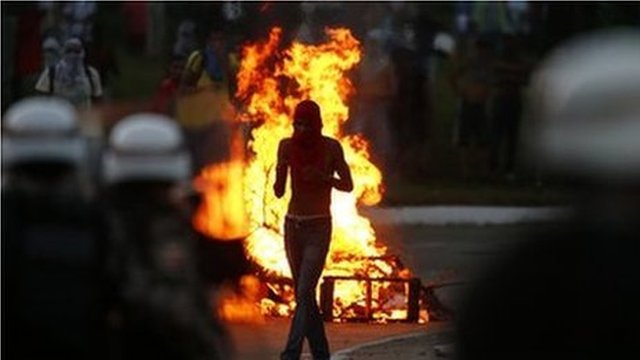
More than one million people have taken part in protests in about 100 cities across Brazil
TV images showed gangs looting shops in the city centre – although many Rio shopkeepers and banks had put up wooden hoardings to protect their premises.
In the capital, Brasilia, demonstrators started a small fire at the entrance to the foreign ministry and were driven back by police using rubber bullets and tear gas.
Other government buildings in the city were attacked and riot police used tear gas and rubber bullets to scatter the crowds. About 26 people were reported injured.
There were also clashes outside a football stadium in Salvador ahead of a Confederations Cup match between Nigeria and Uruguay.
More clashes were reported in Porto Alegre in the south, Campinas north of Sao Paulo and in the north-eastern city of Salvador.
The 18-year-old man killed in the city of Ribeirao Preto was the first person reported to have died in the protests. The motorist who drove through the barricade is said to have fled the scene.
In Sao Paulo, police said 100,000 people had gathered on the city’s landmark Avenida Paulista.
Members of the city’s Free Access Movement (Movimento Passe Livre) – which has been campaigning for better public transport – earlier pledged to take to the streets “to celebrate” the reversal of a public-transport fare increase.
The protests, originally triggered by the increase on 2 June, have since grown into a much wider movement.
Protesters are angry at corruption and poor public services as well as the huge cost of next year’s football World Cup, saying the government should also invest in education and healthcare.
Previous Confederations Cup matches have drawn protests, with demonstrators expressing their anger at steep ticket prices and the money spent on the Confederations Cup, the 2014 World Cup and the 2016 Rio Olympics.
Sao Paulo Mayor Fernando Haddad said Wednesday’s reversal of the fare rise was a “big sacrifice”, which meant other investments would have to be cut.
Sao Paulo and Rio are the latest two cities to reverse such increases after similar moves by the authorities in Cuiaba, Recife and Joao Pessoa.
[youtube -t1NDbJbSPk]
Brazilia’s President Dilma Rousseff has cancelled a planned trip to Japan over continuing mass anti-government protests across the country.
The move is an indication of the seriousness of the situation confronting her, correspondents say.
In the north-eastern city of Salvador, police fired tear gas and rubber bullets to disperse protesters ahead of an international football match there.
Big rallies are being staged in Rio de Janeiro, Brasilia and other cities.
Demonstrators in Sao Paulo earlier said they would take to the streets “to celebrate” the reversal of a public-transport fare increase announced on Wednesday.
The protests, which were originally triggered by the increase, have since grown into a much wider movement.
Demonstrators are angry at corruption and spending on next year’s World Cup.
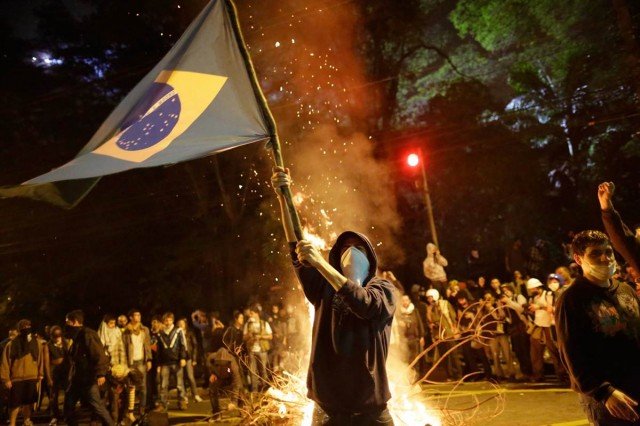
Brazilia’s President Dilma Rousseff has cancelled a planned trip to Japan over continuing mass anti-government protests across the country
On Thursday, President Dilma Rousseff’s office announced that her trip to Japan planned for next week had been called off. Another visit to the Brazilian state of Bahia has also been put on hold.
In a statement, the office acknowledged that the decision had been taken as a result of the continuing demonstrations.
President Dilma Rousseff earlier publicly stated that she was proud that so many people were fighting for a better country.
In Salvador on Thursday, clashes erupted when protesters tried to break through a police barrier near the stadium where a Confederations Cup match between Nigeria and Uruguay is due start later. It was not immediately clear if there were any injuries.
Meanwhile, thousands of people are marching in central Rio de Janeiro near the iconic Candelaria Church, but there have been no reports of violence.
The city authorities earlier erected barricades around the state legislature building, which was vandalized during protests on Monday.
The state governor’s office, Guanabara Palace, and the mayor’s office had been secured by police cordons.
A number of Rio shopkeepers had put up wooden hoardings to protect the front of their businesses and some banks have done the same.
In the capital Brasilia, big crowds gathered outside the National Congress building.
Previous Confederations Cup matches have drawn protests, with demonstrators expressing their anger at steep ticket prices and the money spent on the Confederations Cup, the 2014 World Cup and the 2016 Rio Olympics.
[youtube faMU1WVhMi8]
Brazil’s government has announced it will deploy troops to five major cities to control a wave of protests which has seen almost a quarter of a million people demand better public services.
Members of a national force will be sent to Rio de Janeiro, Minas Gerais, Bahia, Ceara and the capital, Brasilia.
All of the cities are hosting games in FIFA’s Confederations Cup.
The announcement comes after riot police and protesters clashed in fresh protests on Tuesday in Sao Paulo.
Brazil’s ministry of justice said that Recife was the only Confederations Cup host city not to request military support.
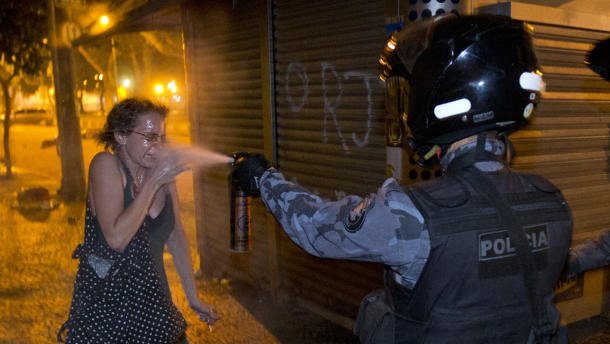
Brazil’s government will deploy troops to five major cities to control a wave of protests which has seen 250,000 people demand better public services
A source in the ministry said it would be up to local governments to decide how long the troops would stay.
Shops and banks in Brazil’s largest city, Sao Paulo, were vandalized on Tuesday by groups of masked activists, who fought other demonstrators trying to stop the violence.
The protest was the latest in a wave of demonstrations engulfing at least a dozen cities.
Brazilian President Dilma Rousseff said she was proud that so many people were fighting for a better country.
The protests were sparked by anger at a rise in public transport fare prices in Sao Paulo on June 2 but have since mushroomed into much broader discontent with high levels of corruption, the poor state of the health and education services and the high cost of living.
They are the largest since 1992, when people took to the streets to demand the impeachment of then-President Fernando Collor de Mello.
[youtube NjlSgkueVn4]
 Prev123Next
Prev123Next  Page 2 of 3
Page 2 of 3

























